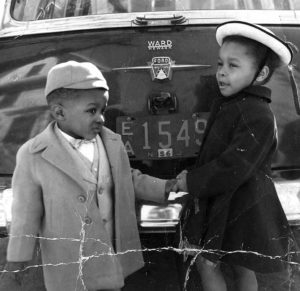Dissertation,
Documentary,
Now, The Book
Sorin’s ‘Green Book’ Thesis
Led To ‘Driving While Black’

By LIBBY CUDMORE • Special to www.AllOTSEGO.com

COOPERSTOWN – Gretchen Sorin has a clear memory of how family vacations always started.
“We would get up at 3 a.m. and get on the road,” the director of the Cooperstown Graduate Program in Museum Studies remembers. “We wouldn’t stop at a restaurant or a hotel, and my parents only stopped at Esso gas stations.
“We drove straight through from New Jersey to North Carolina, where my mother’s family lived. I thought that was just how people took vacations.”
But as she got older, she realized that they had a reason for driving that way. “It was all about not wanting to be denied service when they stopped.”
Her new book, “Driving While Black” compiles many of these stories, as well as research into how car travel facilitated and aided the Civil Rights movement.
“If you’re boycotting buses, how else are you going to get to work?” she said. “During, for example, the Montgomery Bus Boycott, leaders bought fleets of cars and drove people to work. If you were black and you flew into an airport, cabs were segregated, but you could rent a car at the airport.”
Driving gave African Americans freedom that Jim Crow-era buses and trains did not.
“It was accepted that African Americans would be drive trucks or be chauffeurs,” she said. “I heard many stories about black men who would save their money and buy a Cadillac, but would keep a chauffeur’s cap on the seat next to them – if he was pulled over by police, he would show them the cap and say it was his boss’ car.”
The book, which comes out Feb. 11 from Liveright, a W. W. Norton imprint, had its earliest roots in Sorin’s Ph.D. thesis at SUNY Albany, which focused on “The Negro Motorist’s Green Book,” a travel guide for African American travelers.
“I don’t know if my parents had a copy of the Green Book,” she said. “But 90 percent of the people I spoke to said their parents always went to Esso gas stations.”
Esso was a sponsor of the annual Green Book and was known for its policy of opening its gas stations – and just as important, bathrooms – to black travelers.
“A lot of places would be happy to take your money, but wouldn’t let you use a bathroom,” said Sorin. “But Esso was owned by the Rockefellers, who were Baptists, and they did not believe in discrimination.”
But more than the Green Book, her research, which was also used by documentarian Rick Burns, Ken Burns’ brother, for a PBS program, “The Green Book,” delved deep into car culture in the African American community.“
One of the things that was fascinating was that your ethnic group determined what kind of car you bought,” she said. “For instance, Jews didn’t buy Fords, but African Americans did, because Henry Ford employed black workers.”
Most importantly, she said, black families bought cars that were fast, heavy and reliable. “They liked Buicks because you could carry food and water, spare parts, and blankets and pillows,” she said. “They were also too heavy to turn over, and could accelerate fast.”
Speed and weight were crucial, she said, in case you found yourself in a “Sundown Town,” where African Americans were faced with violence if they remained after dark.
“Thurgood Marshall has a story from when he was a lawyer for the NAACP that he was waiting for a train to Shreveport and a man came up to him and said, ‘(Expletive) the last train is at 4 p.m. and you had better be on it, because the sun is never going down on a live (expletive) in this town’,” she said. “So travel guides like The Green Book were crucial to telling you where it was safe to go.”
Sorin will give a reading and do a signing from the book at 4 p.m. Wednesday, Feb. 12 at Roots Brewing Company.
A one-hour cut of the “Driving While Black,” documentary, meanwhile, has been making the rounds at film festivals, including ones in Martha’s Vineyard and Albany. “It got a very positive reaction,” she said. “We still have an hour’s worth of footage to record to make it a two-hour documentary.”

